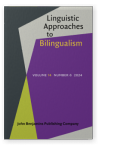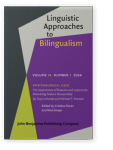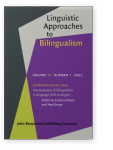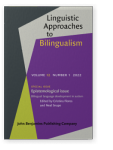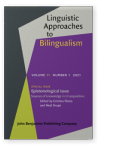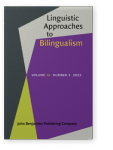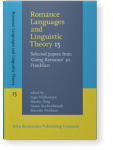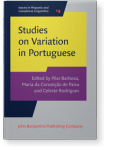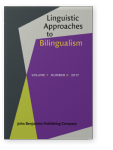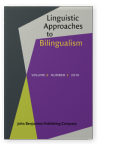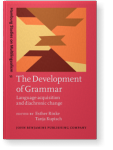Cristina Flores
List of John Benjamins publications for which Cristina Flores plays a role.
Journal
Epistemological issue: The importance of features and exponents: Dissolving Feature Reassembly
Edited by Cristina Flores and Neal Snape
Special issue of Linguistic Approaches to Bilingualism 14:1 (2024) vi, 114 pp.
Subjects Cognition and language | Cognitive psychology | Language acquisition | Multilingualism | Psycholinguistics | Theoretical linguistics
Epistemological issue: The dynamics of bilingualism in language shift ecologies
Edited by Cristina Flores and Neal Snape
Special issue of Linguistic Approaches to Bilingualism 13:1 (2023) vi, 132 pp.
Subjects Cognition and language | Cognitive psychology | Language acquisition | Multilingualism | Psycholinguistics | Theoretical linguistics
Epistemological issue: Bilingual Language Development in Autism
Edited by Cristina Flores and Neal Snape
Special issue of Linguistic Approaches to Bilingualism 12:1 (2022) vi, 102 pp.
Subjects Cognition and language | Cognitive psychology | Language acquisition | Multilingualism | Psycholinguistics | Theoretical linguistics
Epistemological issue: Sources of knowledge in L3 acquisition
Edited by Cristina Flores and Neal Snape
Special issue of Linguistic Approaches to Bilingualism 11:1 (2021) vi, 129 pp.
Subjects Cognition and language | Cognitive psychology | Language acquisition | Multilingualism | Psycholinguistics | Theoretical linguistics
2023 How unique is the linguistic situation of endangered language speakers? Epistemological issue: The dynamics of bilingualism in language shift ecologies, Flores, Cristina and Neal Snape (eds.), pp. 100–105 | Commentary
2022 To hón ich imma insistieat: Syntactic stability in heritage Hunsrückisch German spoken in Brazil Linguistic Approaches to Bilingualism 12:3, pp. 251–279 | Article
This paper investigates syntactic variation in Hunsrückisch German, spoken in a language enclave in South Brazil over eight generations. The aim is to analyse whether this heritage language maintains asymmetric verb placement, i.e. verb-second in main clauses and verb-final in subordinate… read more
2019 Chapter 2. Portuguese as a heritage language in contact with German and French: A comparative study on the acquisition of verbal mood Romance Languages and Linguistic Theory 15: Selected papers from 'Going Romance' 30, Frankfurt, Feldhausen, Ingo, Martin Elsig, Imme Kuchenbrandt and Mareike Neuhaus (eds.), pp. 35–52 | Chapter
This study focuses on the acquisition of verbal mood in complement clauses by two groups of heritage speakers of European Portuguese (EP) (7–16 years old) with similar sociolinguistic profiles and two different dominant languages, German and French. The production of finite complement clauses was… read more
2017 Chapter 6. Variable use of strong preterites: A sociolinguistic and theoretical approach Studies on Variation in Portuguese, Barbosa, Pilar, Maria da Conceição de Paiva and Celeste Rodrigues (eds.), pp. 153–176 | Chapter
This paper examines a particular case of variable syncretism in the Minho region in Portugal, involving the 1st person singular (1sg) and 3rd person singular (3sg) forms of “strong” preterits of the verbs estar ‘be-stative’, ter ‘have’, fazer ‘do’ and ser /ir ‘be’/‘go’. These forms can be levelled,… read more
2016 Comparing heritage speakers and late L2-learners of European Portuguese: verb movement, VP ellipsis and adverb placement Linguistic Approaches to Bilingualism 6:3, pp. 308–340 | Article
This study compares the performance of Portuguese-German heritage children and adult L2 speakers of European Portuguese whose L1 is German with respect to two aspects of grammar, adverb placement and VP-ellipsis, which depend on a core syntactic property of the language, verb movement. The… read more
2011 Perception of German vowels by bilingual Portuguese-German returnees: A case of phonological attrition? The Development of Grammar: Language acquisition and diachronic change, Rinke, Esther and Tanja Kupisch (eds.), pp. 287–305 | Article
This study investigates the perception of German vowels by a group of eight Portuguese adolescents and young adults who were raised bilingually in Germany and returned to Portugal in early childhood (between the ages of 5 and 10 years). All the participants reported that they never use German in… read more
